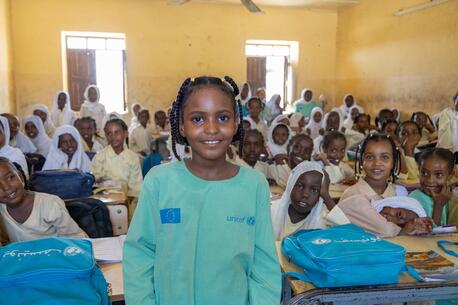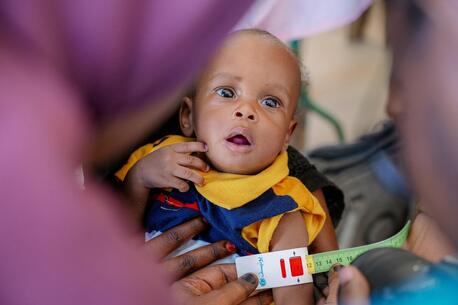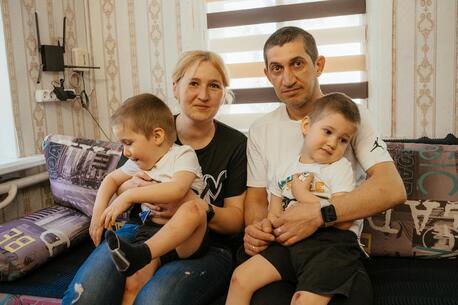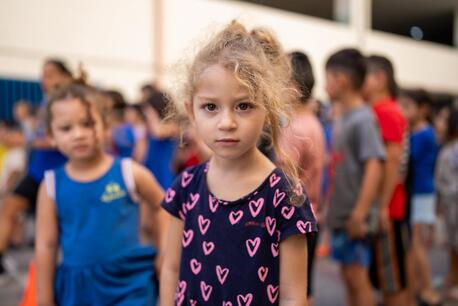
A Deepening Humanitarian Crisis for Children in the Middle East
Violent conflict is endangering children in Gaza, Israel, Lebanon, Syria, Yemen, Iran and Iraq, while threatening to spread to other neighboring countries in the region. UNICEF is on the ground delivering humanitarian assistance and protection alongside partners — but more donor support is needed to scale these efforts, strengthen preparedness and ensure a coordinated response as crises evolve.
Children and communities across the region already reeling from complex crises
As conflict continues to intensify across the Middle East and North Africa, children in the region are living through situations no child should have to endure.
Months of escalating conflict, following the Hamas attacks on Israel on Oct. 7, 2023, have turned the Gaza Strip into the most dangerous place in the world to be a child. Hostilities on the Lebanon-Israel border increased sharply in September 2024, leading to the deadliest period of the conflict, as children continue to experience deeply distressing events. Intensifying conflict threatens to exacerbate existing crises in Lebanon, Syria, Yemen, Iran and Iraq and could spread to other neighboring countries in the region.
Conflict is also forcing children and caregivers away from their homes. Across the Gaza Strip and the West Bank, more than 1.9 million people have been internally displaced multiple times over. In Lebanon, in a few short weeks, over 340,000 people have been displaced internally and over 100,000 have fled into Syria.
At the same time, war in Sudan rages on. Today there are 10.7 million people in the country — half of them children — who have been displaced by that conflict, including hundreds of thousands who have fled into neighboring countries. Egypt is hosting 500,000 of those refugees.
Even before recent escalations in violence, needs were significant all across the Middle East and North Africa region; children were already highly vulnerable due to pre-existing, complex crises, including other protracted armed conflicts, public health emergencies and climate change-related disasters. Millions were already facing high levels of food insecurity and were lacking access to health care and basic water and sanitation services. Millions were already at risk of violence, exploitation and abuse.
UNICEF and partners have been and remain on the ground responding to urgent needs of children and families across the Middle East and North Africa. But more donor support is needed to scale these efforts, to keep up with emerging needs and to implement contingency measures ahead of further escalation.
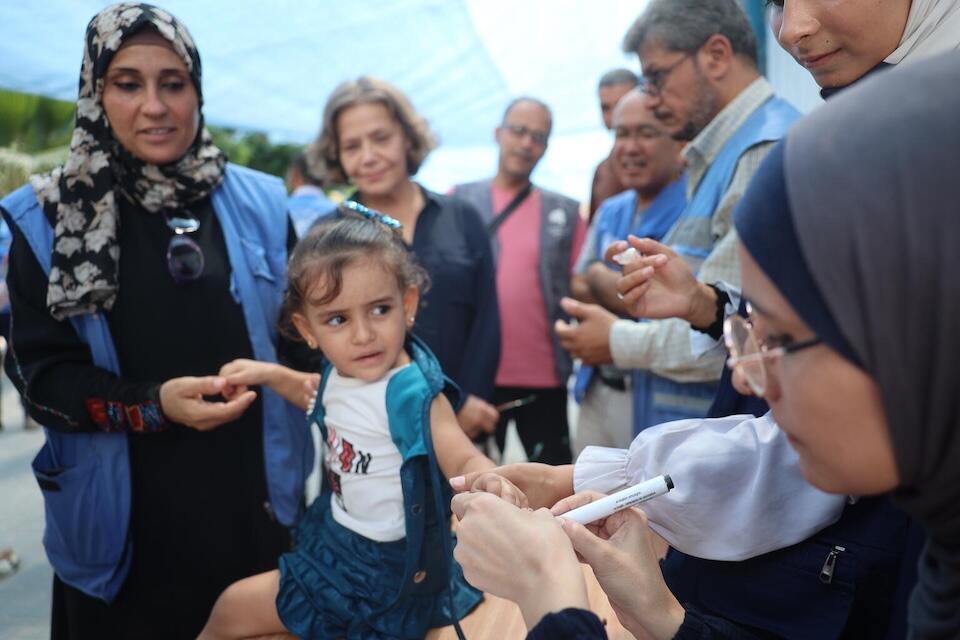
UNICEF in the Gaza Strip and the West Bank
In Gaza, UNICEF has been responding to the most critical and immediate needs of children even before the last year of escalation in conflict.
Ongoing humanitarian interventions are focused on addressing malnutrition, improving access to safe drinking water and sanitation and ensuring access to maternal and child health services and vaccination.
UNICEF is continually adapting its response to address acute needs created by new displacements, public health emergencies and acute food insecurity. When possible, UNICEF is also supporting restoration of essential basic services.
Given the high levels of psychosocial distress due to cumulative exposure to violence, UNICEF has also been scaling up mental health and psychosocial support and other child protection services. These include case management, mental health support and legal services. Basic needs are being met through multi-purpose cash assistance.
In the West Bank, UNICEF is supporting the delivery of health and nutrition services, including malnutrition prevention.
UNICEF remains concerned about the safety of and mental health impacts of conflict on children in Israel. Having visited Israel and Gaza, UNICEF Deputy Executive Director for Humanitarian Action Ted Chaiban reiterated UNICEF's call for a ceasefire and declared a need for a negotiated political solution that prioritizes the rights and well-being of both Israeli and Palestinian children, now and in the future. Hundreds of thousands of Israelis were displaced in 2023, according to IDMC.
UNICEF also continues to call for the immediate and unconditional release of all Israeli hostages. Two children remain in captivity. Learn more about UNICEF's role in Israel, Gaza and the West Bank.
Mobilizing in Lebanon
With the escalation of conflict, UNICEF has been scaling up its on-the-ground presence in Lebanon — including the rapid mobilization in displacement hotspots — while expanding its partnerships to reach high-risk zones.
Pre-existing programs are being expanded to support internally displaced people. These include programs implemented through public and private schools, community centers and child protection service centers, and support for water infrastructure, primary health care centers and hospitals across the country.
UNICEF is also supporting children and families in host communities and Palestinian children and families living in refugee camps in Lebanon. Teams are working to reinforce existing programs against potential shocks. These efforts require prepositioning emergency supplies and diversifying options for delivering humanitarian goods and services.
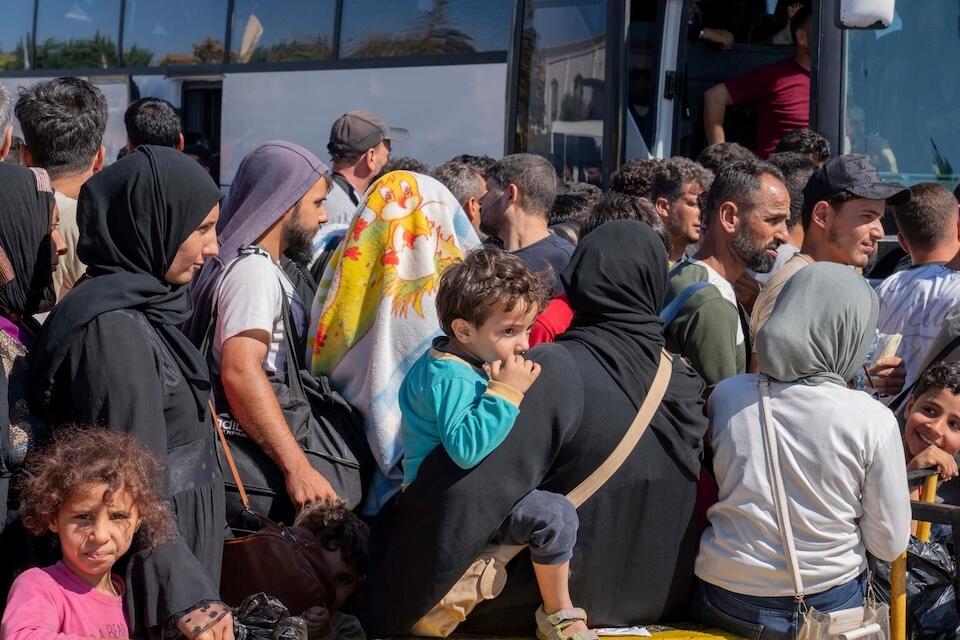
Bracing for more suffering in Syria, Yemen
Thousands of families fleeing conflict in Lebanon are crossing into Syria — a country where an estimated 16.7 million people already require humanitarian assistance, due to multiple crises stemming from a civil war that started in 2011.
There are 6.8 million Syrian refugees living in Egypt, Iraq, Jordan, Lebanon, and Türkiye who rely heavily on humanitarian assistance provided by the international community, and their host countries face ongoing challenges absorbing them into communities and social systems.
In Yemen, a country in its ninth year of conflict, socio-economic systems are on the verge of complete collapse. More than 18.2 million people, 54 percent of whom are children, require humanitarian assistance and protection services. Malnutrition rates among children is alarmingly high, with nearly half of all children under age 5 suffering from moderate to severe stunting. Millions of people remain displaced, many of whom have been displaced multiple times over several years.
One big issue is that Yemen depends heavily on Red Sea ports for most of its food and humanitarian shipments; any disruption in trade along this route spells catastrophe, especially for the north.
Preparedness measures are key should conflict continue to escalate
If conflict in the Middle East continues to spread, children in the region will require additional emergency health care, nutrition, education, child protection, water, sanitation and hygiene (WASH) and social protection services.
Flexible funding from donors enables UNICEF to preposition supplies and put systems in place to ensure a swift and effective response, and to adapt that response as crises evolve and have broader regional impacts. Preparedness saves up to 12 days in response time, on average, and every dollar invested in preparedness saves $4 in response costs.
Help UNICEF reach more children caught in conflict with urgently needed support and protection. Donate today.
HOW TO HELP
There are many ways to make a difference
War, famine, poverty, natural disasters — threats to the world's children keep coming. But UNICEF won't stop working to keep children healthy and safe.
UNICEF works in over 190 countries and territories — more places than any other children's organization. UNICEF has the world's largest humanitarian warehouse and, when disaster strikes, can get supplies almost anywhere within 72 hours. Constantly innovating, always advocating for a better world for children, UNICEF works to ensure that every child can grow up healthy, educated, protected and respected.
Would you like to help give all children the opportunity to reach their full potential? There are many ways to get involved.



